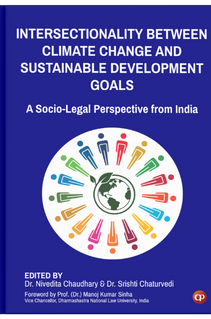Editorial Introduction: Intersectionality Between Climate Change and Sustainable Development Goals: A Socio-Legal Perspective from India

Dr. Nivedita Chaudhary1 & Dr. Srishti Chaturvedi2
1Assistant Professor of Law, School of Law, Amity University, Gurugram, Haryana, India; 2Academician, Ph.D. from National Law Institute University, Bhopal, Madhya Pradesh, India.
10.46679/978819678052400
This chapter is a part of: Intersectionality Between Climate Change and Sustainable Development Goals: A Socio-Legal Perspective from India
ISBN (Ebook):978-81-967805-2-4
ISBN (Hardcover Print):978-81-967805-0-0
ISBN (Softcover Print):978-81-967805-3-1
© CSMFL Publications & its authors.
Published: August 28, 2025
Editorial
The Intergovernmental Panel on Climate Change (IPCC), in its Sixth Assessment Report (AR6), 2021, delivered a clear and alarming message: Climate Change is “widespread, rapid, intensifying, and unprecedented.” India, as one of the most climate-vulnerable and rapidly developing nations, has found itself at the epicenter of this global crisis, facing severe economic, ecological, and social consequences. This edited volume, titled Intersectionality Between Climate Change and Sustainable Development Goals: A Socio-Legal Perspective from India, emerges from a recognition of the urgent need to address the intricate connections between Climate Change and the Sustainable Development Goals (SDGs), particularly from the lens of marginalized communities and socio-legal frameworks.
Climate Change does not exist in isolation. Its impacts reverberate through multiple aspects of society and intersect significantly with various development objectives encapsulated by the SDGs. Recognizing this profound interconnectedness, our book critically explores the complex interplay between climate policy, legal frameworks, socio-economic realities, technological advancements, and governance mechanisms within India, presenting a multi- dimensional analysis from eminent scholars and practitioners.
Structured across six broad thematic areas—Legal and Policy Approaches to Climate Change Prevention; Socio-Cultural and Judicial Perspectives on Climate Action; Human and Societal Consequences of Climate Change; Corporate and Market-Based Approaches to Climate Action; Governance and Regulation of Climate Action; and Technological and Economic Pathways for Climate Change Mitigation—this volume provides a comprehensive scholarly resource that elucidates the depth and breadth of climate intersectionality. The contributing chapters offer robust theoretical insights, critical policy analyses, and practical recommendations that highlight the complex realities faced by India, while also pointing towards innovative and actionable pathways forward.
In Theme I, “Legal and Policy Approaches to Climate Change Prevention,” authors critically evaluate India’s green jurisprudence in alignment with SDGs, examining judicial interpretations, policy actions, and enforcement challenges. They also delve deeply into India’s evolving environmental impact assessments and the pivotal role of judicial interventions and tribunals in enforcing precautionary principles.
Theme II, “Socio-Cultural and Judicial Perspectives on Climate Change Action,” underscores education and eco-feminism, spotlighting how grassroots education, gender-sensitive approaches, and landmark judicial decisions (such as the M K Ranjitsinh case) are pivotal to meaningful climate solutions and conservation efforts.
Theme III, “Human and Societal Consequences of Climate Change,” brings to the forefront the stark realities of climate-induced migration and its disproportionate impact on India’s rural communities, emphasizing urgent socio-legal responses and policy reforms needed to address humanitarian and ecological crises effectively.
Theme IV, “Corporate and Market-Based Approaches,” examines corporate accountability, emphasizing the transformative potential of Corporate Social Responsibility (CSR), biodiversity offsets, and sustainable corporate governance frameworks as essential strategies for aligning business activities with environmental sustainability and human rights obligations.
Theme V, “Governance and Regulation,” explores India’s energy transition challenges and opportunities, especially through innovative financial frameworks such as Just Energy Transition Partnerships (JETPs), while also identifying critical gaps in regulatory frameworks that must be addressed to facilitate sustainable and equitable transitions.
Lastly, Theme VI, “Technological and Economic Pathways,” explores cutting-edge solutions like AI-driven sustainability initiatives, inclusive circular economy models, green chemistry innovations, and sustainable fashion communications, stressing their critical role in climate mitigation and achieving the ambitious targets set by international climate agreements.
This book serves not only as an academic exploration but also as a practical guide aimed at policymakers, academics, practitioners, students, and stakeholders in India and beyond. By fostering nuanced discourse and advocating for integrated policy approaches, it aspires to influence climate policy-making, enrich academic curricula, and provide invaluable insights for corporations, NGOs, legal experts, and governmental bodies striving for sustainability and equity.
We express our sincere gratitude to all contributing authors, whose expertise and insights have shaped this volume into an essential resource for understanding and addressing the complex realities of Climate Change and Sustainable Development intersectionality in India. We extend our gratitude to peer reviewers whose commitment enhanced the quality and depth of this work. Furthermore, we also extend our heartfelt thanks to our publishers, CSMFL Publications, whose dedicated editorial team provided prompt, meticulous, and highly efficient editorial support throughout the publication process. Special thanks to Prof. Manoj Kumar Sinha for giving a foreword to this book adding value and validation to the relevance of this edited volume.
Finally, we are deeply thankful to God, our friends, and family, whose unwavering support, encouragement, and strength enabled us to bring this ambitious project to fruition.
In publishing this volume, we aim to contribute meaningfully to the urgent global dialogue on climate action and sustainable development, firmly believing in the power of informed socio-legal perspectives to drive effective, equitable, and inclusive solutions.
This book is available worldwide via EBSCOhost Academic Collection, EBSCO E- books, Google Play Books, Amazon, World Cat Discovery Service/OCLC, CSMFL Bookstore, and 200+ book resellers and academic content vendors.
Statement on Publication Ethics
We, at CSMFL Publications, are committed to ensure the unbiased and transparent publishing, and upholding the high standards of editorial integrity in our publications. To know more, please read our Statement on Publication Ethics, Editorial Integrity & Misconduct